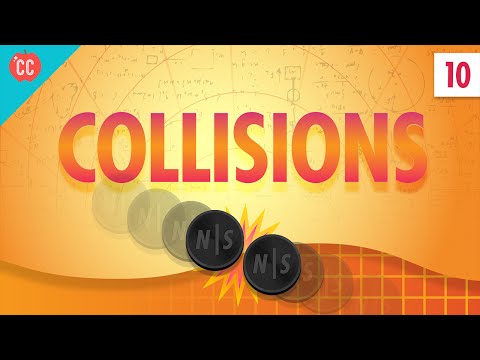COLIZII! O mare parte a fizicii este înțelegerea coliziunilor și a modului în care nu sunt toate la fel. Masa, impulsul și multe alte lucruri dictează modul în care coliziunile pot fi unice. În acest episod din Crash Course Physics, Shini se așează pentru a ne conduce prin înțelegerea coliziunilor. În plus, îl aduce cu vechiul nostru prieten Sir Isaac Newton.
—
Produs în colaborare cu PBS Digital Studios: http://youtube.com/pbsdigitalstudios
—
Doriți să găsiți Crash Course în altă parte pe internet?
Facebook – http://www.facebook.com/YouTubeCrashC…
Twitter – http://www.twitter.com/TheCrashCourse
Tumblr – http://thecrashcourse.tumblr.com
Asistență CrashCourse pe Patreon: http://www.patreon.com/crashcourse
CC Copii: http://www.youtube.com/crashcoursekids
Cursuri interesante:
- Newtonian Gravity: Crash Course Physics #8
- Câmpuri electrice: Fizica cursului accidental #26
- Sunet: Curs intensiv de fizică #18
- Alexandru cel Mare: Crash Course World History #8
- Derivate: Crash Course Physics #2
- Mecanica cuantică – Partea 2: Curs intensiv de fizică #44
- Mișcare în linie dreaptă: fizica cursului intensiv #1
- Motoare: Crash Course Physics #24
- Light Is Waves: Crash Course Physics #39
- Reprezentarea numerelor și literelor cu binar: curs intensiv Informatică #4

We made quiz questions to help you review the content in this episode! Find them on the free Crash Course App!
Download it here for Apple Devices: https://apple.co/3d4eyZo
Download it here for Android Devices: https://bit.ly/3TW06aP
Okay, so I'm really sorry I'm writing this here since this might sound like somewhat of a stupid question, but can anyone please explain what she means when she says Impulse = integral of Fnet over time? To be honest, I don't really think I completely understand integrals yet- I watched CC's episodes on calculus, but I think all my tiny brain understood was that integrals were the opposite of derivatives, and that they were the area under curves. For some reason derivatives always made sense to me, so I guess it was more convenient for me to think of integrals that way. Anyways, I was hoping someone could please explain this a little further. Thank you 🙂
why dont you cover elastic potential energy only in horizontal motion?
Hello, Thank you, very interesting explanation.
How will the two balls in the pool table example be affected by the white ball having acceleration as opposed to deceleration at the moment of contact?
Hello there! May I know her name? I'm enjoying the course
Literally so helpful
You americans are so strange, you call impulse J, in sweden we call it I, because Impulse xD